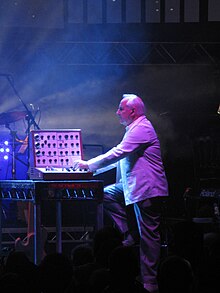
The BBC Radiophonic Workshop was one of the sound effects units of the BBC, created in 1958 to produce incidental sounds and new music for radio and, later, television. The unit is known for its experimental and pioneering work in electronic music and music technology, as well as its popular scores for programmes such as Doctor Who and Quatermass and the Pit during the 1950s and 1960s.
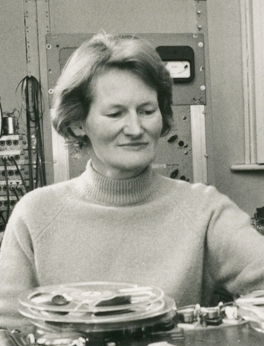
Daphne Blake Oram was a British composer and electronic musician. She was one of the first British composers to produce electronic sound, and was an early practitioner of musique concrète in the UK. As a co-founder of the BBC Radiophonic Workshop, she was central to the development of British electronic music. Her uncredited scoring work on the 1961 film The Innocents helped to pioneer the electronic soundtrack.
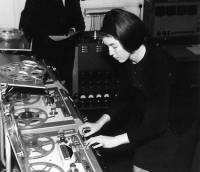
Delia Ann Derbyshire was an English musician and composer of electronic music. She carried out notable work with the BBC Radiophonic Workshop during the 1960s, including her electronic arrangement of the theme music to the British science-fiction television series Doctor Who. She has been referred to as "the unsung heroine of British electronic music", having influenced musicians including Aphex Twin, the Chemical Brothers and Paul Hartnoll of Orbital.
The Doctor Who theme music is a piece of music written by Australian composer Ron Grainer and realised by Delia Derbyshire at the BBC Radiophonic Workshop. Created in 1963, it was one of the first electronic music signature tunes for television. It is used as the theme for the science fiction programme Doctor Who, and has been adapted and covered many times.
Paddy Kingsland is a composer of electronic music best known for his incidental music for science fiction series on BBC radio and television whilst working at the BBC Radiophonic Workshop. Educated at Eggar's Grammar School in Alton, Hampshire, he joined the BBC as a tape editor before moving on to become a studio manager for BBC Radio 1. In 1970 he joined the Radiophonic Workshop where he remained until 1981. His initial work was mostly signature tunes for BBC radio and TV programmes before going on to record incidental music for programmes including The Changes, two versions of The Hitchhiker's Guide to the Galaxy, as well as several serials of Doctor Who. His work on the latter series included incidental music for several serials in the early 1980s.
Malcolm Clarke was a British composer and experimental electronic musician. He was a member of the BBC Radiophonic Workshop, which was based in Maida Vale, London, for 25 years from 1969 to 1994.
Brian Hodgson is a British television composer and sound technician. Born in Liverpool in 1938, Hodgson joined the BBC Radiophonic Workshop in 1962 where he became the original sound effects creator for the science fiction programme Doctor Who. He devised the sound of the TARDIS and the voices of the Daleks, which he created by distorting the actors' voices and feeding them through a ring modulator. he also effectively scored four serials under the credit of "Special Sound". He continued to produce effects for the programme until 1972 when he left the Workshop, leaving Dick Mills to produce effects for the remainder of the show's run.
Peter Howell is a musician and composer. He is best known for his work on Doctor Who as a member of the BBC Radiophonic Workshop.
Roger James Limb is a British composer, specialising in electronic music. He was born in 1941 in Hitchin, Hertfordshire, England, UK. He is best known for his work on the television series Doctor Who whilst at the BBC Radiophonic Workshop. He joined the BBC as a studio manager, before going on to become a television announcer. In 1972 he left this position to join the Radiophonic Workshop, where he remained until 1995. Although he had received formal music training, he also spent much time in pop and jazz bands, the influence of which can be heard in much of his music.
Elizabeth Parker is a British film and television composer who worked at the BBC Radiophonic Workshop from 1978 until the workshop's closure.

The Radiophonic Workshop is a 1975 compilation album by the BBC Radiophonic Workshop, similar in concept to the earlier BBC Radiophonic Music of 1968. The album featured a variety of work demonstrating many of the various techniques the Workshop used. Unlike its predecessor though, it was far more synthesiser orientated. The music comes from all types of sources from serious drama and documentary to the "Major Bloodnok's Stomach" sound effect from The Goon Show. As with the 1968 compilation, the album was remastered in 2002 by Mark Ayres and re-released with two bonus tracks from John Baker.
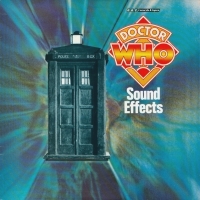
BBC Sound Effects No. 19: Doctor Who Sound Effects is a 1978 compilation of sound effects by the BBC Radiophonic Workshop from the BBC science fiction series Doctor Who. It was the first album in the BBC Sound Effects series to feature solely Radiophonic Workshop output and also the first commercial release of an album of the Doctor Who sound effects and atmospheres. The effects included came from throughout the show's history, covering both Brian Hodgson and Dick Mills' time recording effects for the programme. Effects that did not appear on the compilation included the TARDIS taking off and landing, sounds which are considered to be works of music by the BBC rather than mere effects. Each side of the record was re-released in the United States as a part of pair of picture disc compilations, which also included tracks from Doctor Who - The Music. It was remastered and re-released on 2 February 2012, by AudioGo. It was the first time the album had a CD release in the UK. AudioGo and Discovery Records then re-released the original vinyl LP on 21 April 2012 as part of Record Store Day.
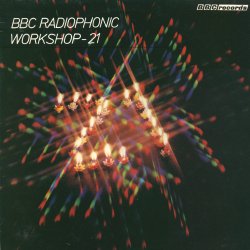
BBC Radiophonic Workshop – 21 is a compilation by the BBC Radiophonic Workshop to celebrate their 21st anniversary in 1979. It was compiled as an overview of their work both old and new, showcasing the changes in the Workshop as they developed from backroom sound effects suppliers for BBC Radio to full-fledged in-house music composers for the whole of the corporation. It demonstrates the move from the musique concrète and tape-manipulation techniques used in the early days, to the synthesiser works of the 1970s. The first side of the album consisted of material from 1958 to 1971, covering their early work creating jingles, sound-effects and some incidental music. This side includes the first material by Workshop founder Desmond Briscoe to be commercially released, as well as sound effects from The Goon Show, Maddalena Fagandini's interval signal that later became "Time Beat", some of Delia Derbyshire's experimental work and the pilot episode version of the Doctor Who theme music. The second side of the record covered the period between 1971 and 1979, including Richard Yeoman-Clark material from popular BBC series Blake's 7 and Peter Howell's vocoder heavy "Greenwich Chorus" theme for The Body in Question. It was reissued on CD by Silva Screen Records on 22 April 2016.
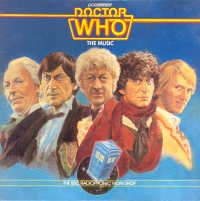
Doctor Who: The Music is a 1983 compilation of music from the BBC Radiophonic Workshop featuring incidental music from the popular science-fiction television series Doctor Who. The album was the first full-length to feature solely music from the programme. The collection was produced by Workshop member and long-time Doctor Who sound-effects creator Dick Mills. It featured the original Delia Derbyshire arrangement of Ron Grainer's theme tune and music by Malcolm Clarke from the 1972 serial "The Sea Devils", which was only the second to have an incidental score provided completely by the Radiophonic Workshop. Most of the music included came from serials from the previous three years to demonstrate the recent composers' works. For the album, each serial's incidental music was reassembled into short "suites" and although most of the music had been recorded in mono it was, for this compilation, remixed into stereo with sound effects added on to some tracks. The album was re-released in 1992 by Silva Screen records as Earthshock - Classic Music From The BBC Radiophonic Workshop Volume 1, with bonus tracks including "The Worlds of Doctor Who", a track recorded by Mills as a B-side to Dudley Simpson's 1973 "Moonbase 3" single, which featured a mix of music with sound effects from Planet of the Daleks before following with Simpson's "Master's Theme" and finishing with music from the serial The Mind of Evil. Selections from both this compilation and its follow-up, Doctor Who: The Music II, were also re-used on the 1994 Silva Screen compilation The Best of Doctor Who Volume 1: The Five Doctors.

Doctor Who at the BBC Radiophonic Workshop Volume 1: The Early Years 1963–1969 is the first in a series of compilations of Doctor Who material recorded by the BBC Radiophonic Workshop. Compiled and remastered by Mark Ayres, the album features mostly sound effects and atmospheres from the first six years of the programme. Although some incidental music tracks do appear, most of the album's content is by original Doctor Who sound effects creator Brian Hodgson. The compilation also features three Radiophonic Workshop realisations of early Doctor Who composer Dudley Simpson's work.

Doctor Who at the BBC Radiophonic Workshop Volume 2: New Beginnings 1970–1980 is the second in a series of compilations of BBC Radiophonic Workshop music from Doctor Who. The album collected various incidental music from the 1970s including, for the first time, the complete Malcolm Clarke score for the 1972 serial The Sea Devils, only the second scored completely by the Radiophonic Workshop. The compilation also featured a few of Dudley Simpson's compositions as realised by Brian Hodgson, some Delia Derbyshire music as featured in Inferno, two Peter Howell demos from 1979 and a selection of Dick Mills' sound effects from the era.

Doctor Who at the BBC Radiophonic Workshop Volume 3: The Leisure Hive is the third in a series of compilations showcasing the BBC Radiophonic Workshop's work on the science-fiction programme Doctor Who. The album focused mainly on the Peter Howell synthesiser score for the 1980 serial The Leisure Hive, which received its first full release here. The compilation also collected some Dick Mills sound effects from the story as well as some effects from other 1980 serials Meglos and Full Circle, whose music would be the subject of the fourth volume in the series. The final track was a new remix of the original Delia Derbyshire version of the show's theme tune by series compiler Mark Ayres.
Harry Desmond Briscoe was an English composer, sound engineer and studio manager. He was the co-founder and original manager of the pioneering BBC Radiophonic Workshop.
Inventions for Radio were a series of four radio broadcasts that first aired on BBC's Third Programme in 1964 and 1965. The broadcasts, titled The Dreams, Amor Dei, The After-Life and The Evenings of Certain Lives, were created by Delia Derbyshire of the BBC Radiophonic Workshop and Barry Bermange. Each of the individual broadcasts consists of a sound collage of electronic music and effects combined with spliced and remixed dialogue from interviews with everyday people. Each "invention" addressed an individual theme—dreams, the nature and existence of God, life after death, and ageing.
